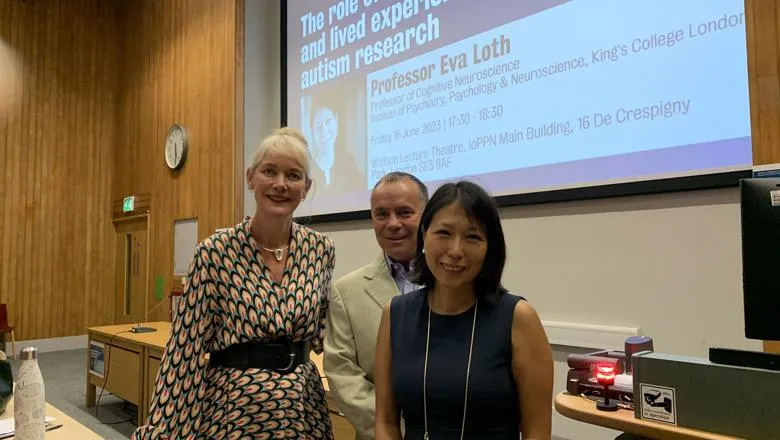I’m moved to see so many familiar faces, and so many of you have been instrumental in my work over the last few years… One of the things that is really remarkable looking back over the last 20 to 25 years is how much has changed in what we thought we knew about autism… Working with so many different experts in different fields and areas, including autistic collaborators, has been really critical and so enriching for me.
Professor Eva Loth
17 July 2023
Professor Eva Loth delivers IoPPN inaugural lecture on autism research
Professor Eva Loth delivered the seventh lecture of the 2022/23 Institute of Psychiatry, Psychology & Neuroscience (IoPPN) Inaugural Lecture Series, titled “The role of concepts, trends and lived experiences in autism research”.

Eva Loth is Professor of Cognitive Neuroscience in the Department of Forensic and Neurodevelopmental Science (FANS) at the IoPPN. Her work integrates developmental, cognitive and neuroimaging approaches to understand the interplay between social, emotional, motivational and cognitive processes in ‘typical development’ and neurodevelopmental conditions, particularly autism. A key focus of her current work is on creating individual profiles of strengths and difficulties across these areas that can be clinically used to separate a diverse condition into subgroups to help predict a person’s therapeutic needs.
In her lecture, which took place in the Wolfson Lecture Theatre at the IoPPN on Friday 16 June 2023, Professor Loth gave a whistle-stop tour of her education and career, and discussed the development of her research into neurodevelopmental conditions.
Professor Declan Murphy, Professor of Translational Neurodevelopment at King’s IoPPN and Head of FANS, opened the lecture with a welcome speech showcasing Professor Loth’s success: “Eva, as we all know, is just the most incredible scientist and we’re so lucky to have you in the Institute and, particularly, in the Department.”
Professor Loth received her PhD in psychology from St. Andrews University, Scotland, and completed postdoctoral placements at the IoPPN and Cambridge University, where she began conducting neuroimaging research in cognitive development.
Professor Loth has worked on several large-scale studies on cognitive development and autism. She began working on IMAGEN, a IoPPN-led European research project which uses brain imaging and genetics to examine how biological, psychological and environmental factors during adolescence influence brain development and mental health. She then worked on the European Autism Interventions (EU-AIMS) consortium, one of the largest ever research projects aimed at developing precision medicine for autism. As part of the EU-AIMS, she worked on the Longitudinal European Autism Project (LEAP) which aims to identify biomarkers (for example, cognitive profiles, brain structural or functional measures, immune markers or genetics) to predict a person’s natural development, their likely therapeutic needs, and the benefits of interventions. She is now Deputy Director of AIMS-2-TRIALS, which is a €115 million award from the Innovative Medicines Initiative (IMI) to create the world’s largest autism consortium. The project is a public–private partnership that brings together 48 partners across academia, industry, the autism community, charities and regulators to improve health outcomes and wellbeing for autistic people.
Professor Loth also now leads the UKRI Network Plus “RESPECT 4 Neurodevelopment” network, which aims to bring together academics, clinicians, industry, families, and people with lived experience to develop responsible, reliable, scalable and personalised neurotechnologies to advance precision support for infants and young children with neurodevelopmental conditions.
In her lecture, Professor Loth emphasised the importance of collaborating with autistic people from the outset of research. She explained that the voices of neurodivergent people are crucial to guiding the direction of autism research and enhancing its quality.
In the closing vote of thanks, Professor Francesca Happé, Professor of Cognitive Neuroscience at King’s IoPPN, said: “I’ve been lucky to know Eva for almost 25 years… What so impresses me about Eva, is how she’s gone from being a cognitive psychologist to mastering so many different disciplines and fields, from neuroscience, neuroimaging and genetics to neurotechnology. And, because of that, she can bring people together across different countries, disciplines and groups and help them to work really effectively together.”
One of Professor Loth’s past PhD students said: “Eva is an amazingly intelligent, hardworking academic who encourages her students to do the very best science by critically considering their own ideas and those of others. Eva is generous with her time always. I know that she has always rooted for her students and is incredibly proud of them all. And we are all super proud of her today too; she couldn’t deserve the achievement more.”
Watch the full lecture below:
View previous Inaugural Lectures here.

